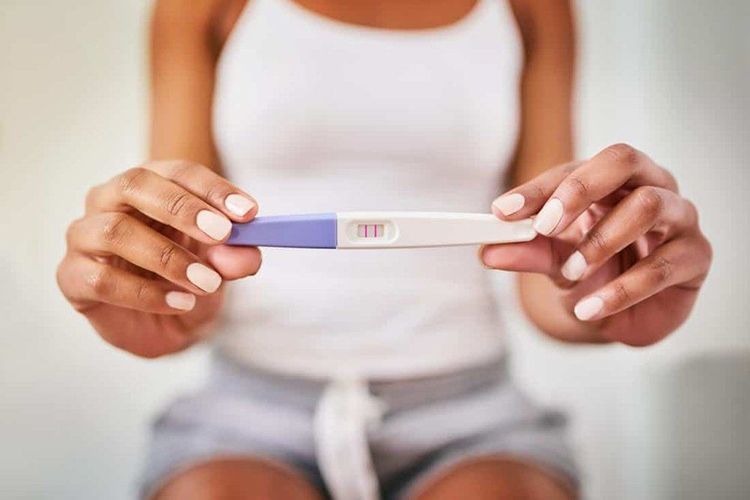This is an automatically translated article.
Oral contraceptives are a form of hormonal contraception. Possible side effects are different for each individual. Mainly some common side effects include: Nausea, chest tightness and headache. So, taking birth control pills and still getting pregnant, does it have any effect?1. What is oral contraceptive?
Oral contraceptives work by stopping the body from producing eggs, which means there's nothing for the sperm to fertilize, and pregnancy can't happen.Specific side effects may appear different for each individual taking the drug. However, some common side effects include spotty bleeding, nausea, breast tenderness, and headache.
There are two main types of birth control bills. The combination pill contains estrogen and progestin, which is a synthetic form of the natural hormone progesterone, while the mini pill contains only progestin.
2. Side effects of birth control pills
Birth control pills affect a person's hormone levels, leading to various side effects. These effects usually go away within 2-3 months, but they can be long-lasting.If the side effects are persistent or bothersome, it's best to talk with your healthcare provider about trying a different brand or a different birth control method. The sections below look at some of the common side effects of birth control pills.
2.1. Spotted bleeding Intermenstrual bleeding, also known as spotting, refers to the time when vaginal bleeding between menstrual cycles, it's like light bleeding or brown discharge.
2.2. Nausea Some people feel mild nausea when they first take the medicine. If the nausea is severe or persists for several months, it's best to talk to your healthcare provider.
2.3. Breast engorgement Taking birth control pills often makes breasts feel tender, especially right after starting the pill. Along with increasing breast sensitivity, the hormones in the pill can make breasts bigger. If this condition is breast engorgement, breast pain persists you need to talk to your pharmacist/doctor.
2.4. Headaches and Migraines The hormones in birth control pills can cause or increase the frequency of headaches and migraines.
Changes in female sex hormones (estrogen and progesterone) can trigger migraines. Symptoms may depend on the dose and type of drug. For example, low-dose drugs are less likely to cause this symptom.
On the other hand, if a person's migraines are related to premenstrual syndrome, taking medication can actually relieve their symptoms.
2.5. Weight gain Weight gain is a possible side effect. In theory, oral contraceptives could increase water retention or water weight. They can also lead to an increase in fat or muscle mass. However, some people may report weight loss while taking the pill instead.
According to a 2017 article, there is still not enough research to confirm whether the hormones in birth control pills lead to weight gain or weight loss.

Uống thuốc tránh thai vẫn có thai có ảnh hưởng gì không là thắc mắc của nhiều chị em
2.7. Amenorrhea or amenorrhea Taking birth control pills can cause very light or late periods. This is due to the hormones they contain.
Depending on the type of birth control pill, people can safely use birth control pills. If a person suspects that they may be pregnant, it is best to take a pregnancy test. Birth control pills are very effective, if you use them correctly. But vice versa can get pregnant, if used improperly.
Many factors can cause a missed period or missed period, including:
Stress Being sick Hormonal problems Thyroid problems . 2.8. Decreased libido Pills can affect sex drive in some people. This is due to hormonal changes.
2.9. Vaginal discharge Changes in vaginal discharge may occur when the pill is taken. This may be an increase or decrease in vaginal lubrication or a change in the nature of the discharge.
3. Contraceptive pills are not safe for whom?
Birth control pills are safe for most women to use. However, research has linked its use to certain risks. Therefore, before taking oral contraceptives, it is important to discuss an individual's risk factors with a healthcare provider.The pill may not be safe for people who:
Have untreated hypertension Smoke and are over 35 years old Have a history of heart disease Have migraines with aura Have a history of breast or endometrial cancer uterus .

Sau khi uống thuốc tránh thai vẫn có thai bạn nên chú ý đến sức khoẻ hơn
4. Does taking birth control pills still get pregnant?
"Is there any effect on taking birth control pills to still get pregnant?" . In some cases, after using oral contraceptives after pregnancy, are they often worried and afraid of affecting the pregnancy?Many people often believe that taking oral contraceptives can lead to birth abnormalities, some conflicting information, suggested that birth control pills containing the hormone progestin can lead to hypospadias, a birth defect that affects the body's image. affect the urethral opening of the penis. However, recent studies show that these effects are not significant. But it is best to stop taking the pill after learning that you are pregnant.
In addition, after using birth control pills and knowing you are pregnant, you should pay more attention to your health, keep your mind at ease, sleep and eat well; Routine antenatal check-ups as directed by your doctor. Especially in the first months of pregnancy, it is important to remember important antenatal check-up milestones such as:
Important milestones such as:
Antenatal check-up as soon as you know you are pregnant A prenatal check-up at 5 to 7 weeks pregnant, to see if the pregnancy is correct. fetal heart and still developing or not? At 12 weeks and 16 weeks pregnant, you can have a screening test for fetal malformations. Pregnant women at 22 and 30 - 32 need color ultrasound to monitor fetal health, screen for fetal malformations, and promptly detect abnormalities; To protect mother and baby's health comprehensively, Vinmec International General Hospital now has a full maternity service, with a team of highly qualified doctors, ultrasound system, and well-equipped medical equipment. Modern devices will promptly recognize abnormalities during pregnancy, help monitor the health of mother and baby right from the beginning of pregnancy, early detect and intervene in time health problems.
In addition, at Vinmec, we also perform intensively Double Test or Triple Test tests to screen for fetal malformations; Quantitative angiogenesis factor test to diagnose preeclampsia; thyroid screening test; Rubella test; testing for parasites that are transmitted from mother to child, which seriously affects the baby's brain and physical development after birth...
After birth, the baby will be cared for in a sterile room before being brought back back to mom. Pregnant women will rest in a high-class hospital room, designed according to international hotel standards, 1 mother 1 room with full facilities and modern equipment. Mothers will be consulted by nutritionists on how to feed the baby before being discharged from the hospital. Postpartum follow-up with both mother and baby with leading Obstetricians and Pediatricians.
Please dial HOTLINE for more information or register for an appointment HERE. Download MyVinmec app to make appointments faster and to manage your bookings easily.













